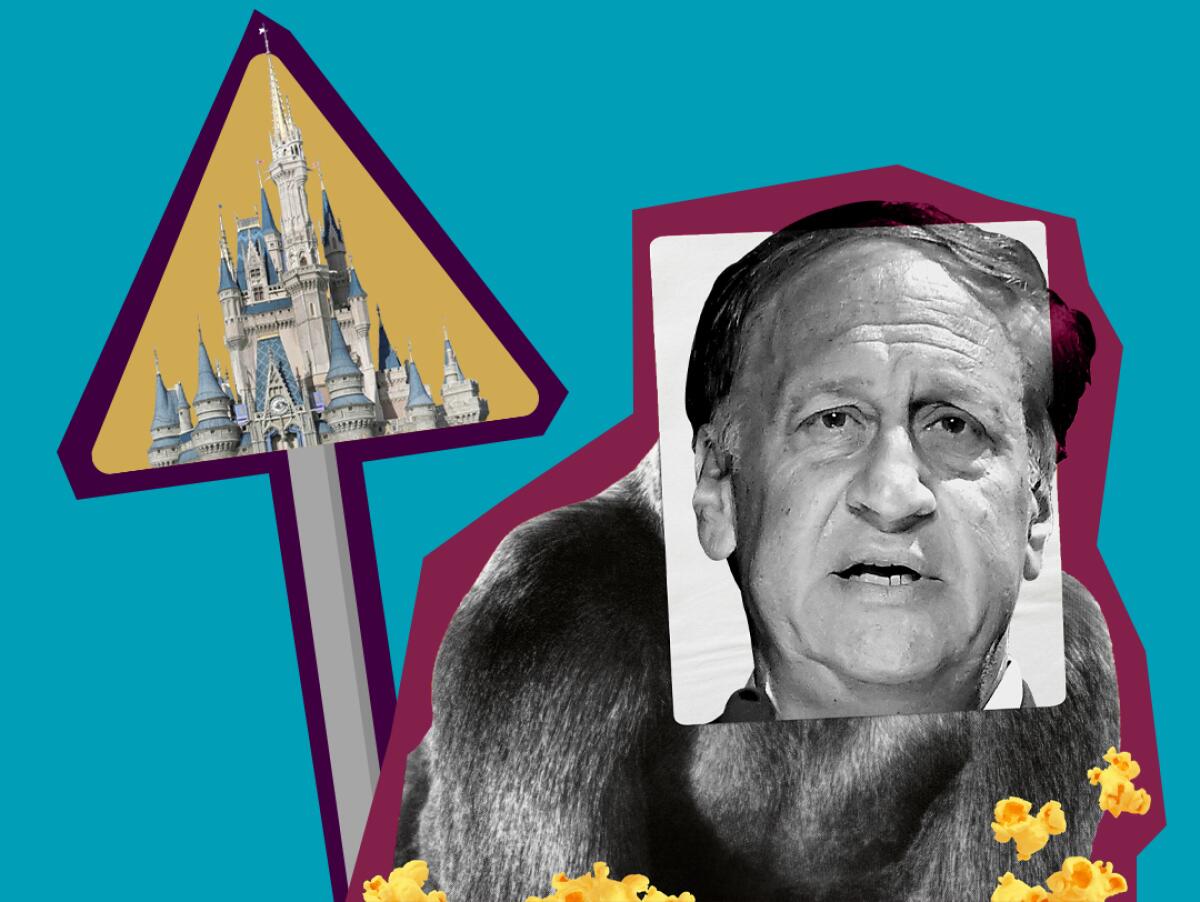Adam Aron and AMC’s planet of apes; Disney’s latest headaches

- Share via
This is the June 21, 2022, edition of the Wide Shot newsletter about the business of entertainment. If this was forwarded to you, sign up here to get it in your inbox.
If you had Monday off for Juneteenth, I hope it was a restful holiday. In case you missed this, please check out The Times’ “Behold,” a major interactive photo and text project on Black L.A., which features fantastic portraits of local artists, entrepreneurs and community leaders. Definitely worth your time.
This week I profiled Adam Aron, the outlandish chief executive of AMC Theatres, who has polarized Hollywood with his embrace of NFTs, cryptocurrency, a cult-status Nicole Kidman commercial and an investment in a literal gold mine. Here’s a short snippet from the piece, which is available exclusively to Times subscribers:
“To some, he’s a savvy operator who came into the theater business as an outsider but saved AMC from almost certain bankruptcy during the pandemic. To critics, though, his penchant for P.T. Barnum-esque showmanship is wearing thin. They say his outlandish moves — such as investing in a struggling Nevada gold mine and the retail popcorn business — do more to boost AMC’s share price and his own portfolio than to help the movie business recover.”
Beyond that, Netflix is bracing for its next round of layoffs in response to its subscriber shortfall and revenue slowdown, as previously forecast. This comes a little more than a month after Netflix sent about 150 full-time, mostly U.S.-based workers packing, in addition to dozens of contractors and part-time employees.
No word on exact numbers but the departments affected by these cuts will be different from those hit last time around, according to people familiar with the matter who were not authorized to comment.
Here’s what else is going on.
Not quite to infinity

“Solo: A Star Wars Story.” “Fast & Furious Presents: Hobbs & Shaw.” These days, as Hollywood milks its intellectual property for all it’s worth, many movie franchises have produced that one spinoff that pushed the limits of a connected film universe.
Now “Lightyear” has become that film for Pixar Animation Studios’ “Toy Story” series, which for 27 years has been a boon to the Walt Disney Co.-owned computer animation powerhouse.
“Lightyear,” with Chris Evans voicing the famous space ranger, grossed $51 million in North American ticket sales Friday through Sunday, a disappointing result considering analysts had predicted an opening weekend of about $70 million.
Including international sales, the film collected $85.6 million, according to studio estimates. Domestically, it failed to top “Jurassic World Dominion” for the No. 1 spot on the charts, despite poor reviews for the dino-sequel, which won its second weekend in a row.
The Pixar film’s modest opening is an unexpected headache for Disney, as the company starts bringing its animated movies exclusively to theaters again. “Lightyear” was the first Pixar film to get an exclusive theatrical release since 2020’s “Onward.” The most recent Pixar release, the acclaimed “Turning Red,” premiered exclusively on Disney+, an example of the company using its animation prowess to boost its high-priority streaming business.
Read the rest of the analysis.
Stuff we wrote
— Disney’s latest Florida problem. Walt Disney Co. has delayed by three years its plan to move 2,000 jobs, including Imagineering and consumer products, to central Florida. Disney denied the decision had anything to do with Gov. Ron DeSantis and the “Don’t Say Gay” dispute, instead blaming a construction holdup at its new Lake Nona campus.
— He’s everywhere, all at once. With nearly 700 credits at age 93, legendary actor James Hong, one of the stars of the Daniels’ “Everything Everywhere All at Once,” isn’t done yet. Jen Yamato profiled the actor, who has become an internet fave.
— You had me at “Drunk Rudy.” The Times’ Lorraine Ali has been watching and chronicling the dark reality TV spectacle of the Jan. 6 hearings, and I am here for her consistently entertaining recaps and analysis.
— A party scene while making Amazon’s “Expats” was followed by a COVID outbreak. Then things got complicated...
— Headlines, headlines, headlines. WWE says CEO Vince McMahon to step back during misconduct probe. Mo’Nique, Netflix reportedly settle her lawsuit alleging bias. Former Fox News political editor Chris Stirewalt gets the spotlight at Jan. 6 committee hearing. With Netflix’s ‘Chosen One’ crash, Tijuana loses two pillars of its arts scene. ‘Crash’ writer, director Paul Haggis arrested in sexual assault case in Italy.
Number of the week

Every media company is competing for sports rights. Guess who wins? Sports leagues!
Major League Soccer awarded the exclusive global streaming rights to its games to Apple in a 10-year deal, “further cementing the tech giant’s foray into live sports,” as Stephen Battaglio wrote.
Sports are attractive for streaming companies because they are “sticky” for subscribers. Instead of getting fickle consumers to sign up for a two-hour movie, after which they might bail, streamers can attract folks who will watch soccer or baseball for weeks and months. Churn rates from people who signed up for sports are generally lower than for other types of shows, according to data from Antenna.
So it’s especially interesting that Walt Disney Co. decided to pay $3 billion for the five-year broadcast TV rights for India Premier League cricket but lost out on digital rights to competitor Viacom18, a joint venture of Paramount Global and India’s Reliance Industries.
Yes, stateside readers, cricket is very important for streaming, as companies look to international markets for new customers.
IPL matches helped the Disney+ Hotstar service grow subscriber numbers. Analysts anticipate the company could take a 15-million subscriber hit as a result of losing the matches. Those subscribers don’t contribute much revenue to Disney’s top line (Disney+ Hotstar’s average revenue per user was 76 cents a month last quarter) but they boosted the service’s overall sub counts, which is important to Wall Street.
Losing them will make it harder for Disney CEO Bob Chapek to hit his goal of 230 million to 260 million members by 2024. Disney, for its part, has previously said it believed it would hit its Disney+ subscriber guidance with or without IPL cricket rights. Rebecca Campbell, Disney’s international content chair, noted in her statement on the deal that Disney “will be exploring other multiplatform cricket rights,” including those for leagues that it currently holds through 2023 and 2024.
However, Disney’s decision fits with the streaming industry’s newfound ethos of responsible spending, even if it’s still paying more than what it previously did for the broader cricket package. Traditional TV sports rights are easier and quicker to monetize through advertising and other means.
The end result is that IPL nearly triples its rights package to $6.2 billion, so good for them. Whether the deals pay off for the media companies remains a sticky wicket.
You should be reading...
— Joe Flint on Disney’s ascendant TV topper Dana Walden. Can she rise above the corporate chaos? (Wall Street Journal)
— Jeremy Barr on the New York Times’ new executive editor, Joe Kahn. “Don’t expect a revolution.” (Washington Post)
— Lacey Rose on the enduring career of former “SNL” star Maya Rudolph. (Hollywood Reporter)
Finally ... Mr. Show

I finally got an audiobook copy of Bob Odenkirk’s memoir “Comedy Comedy Comedy Drama.” This is no shocker, but the guy who penned Chris Farley’s classic “van down by the river” “SNL” sketch really can write a story. Here’s Glenn Whipp’s May profile of Odenkirk for The Times.
Inside the business of entertainment
The Wide Shot brings you news, analysis and insights on everything from streaming wars to production — and what it all means for the future.
You may occasionally receive promotional content from the Los Angeles Times.




